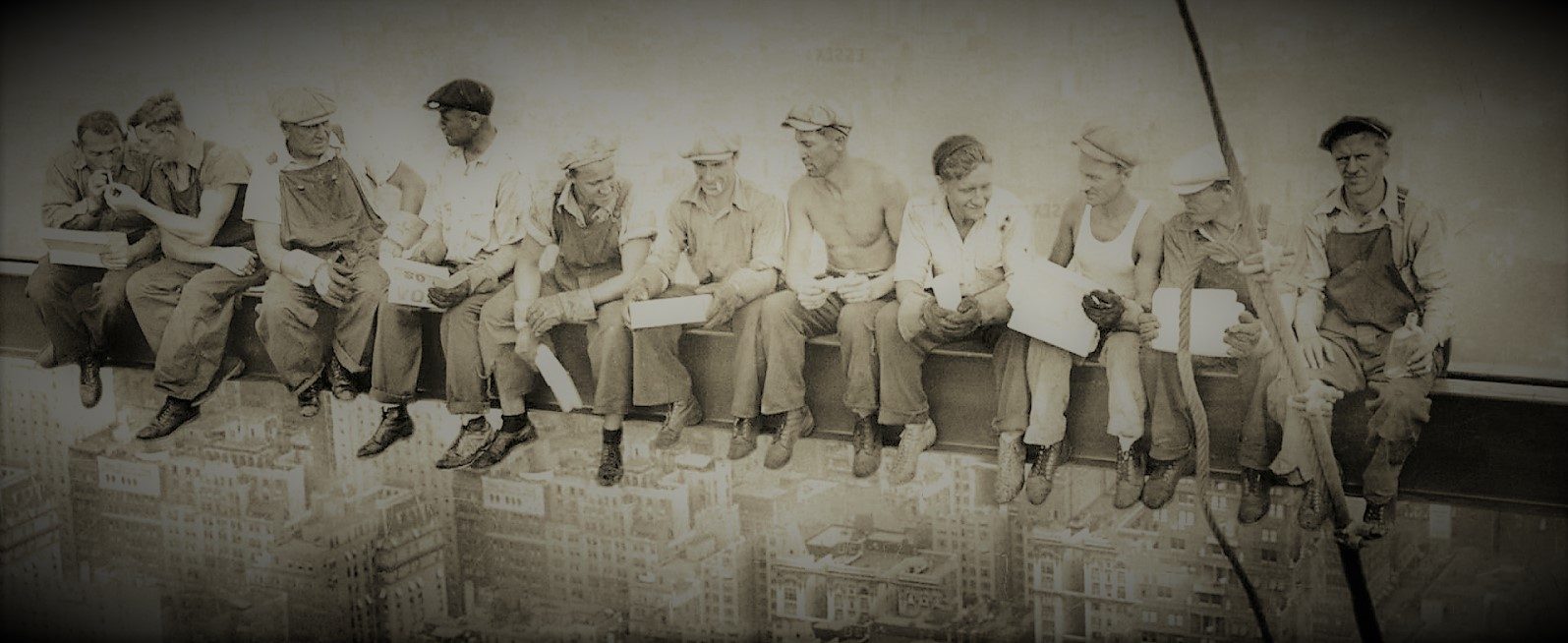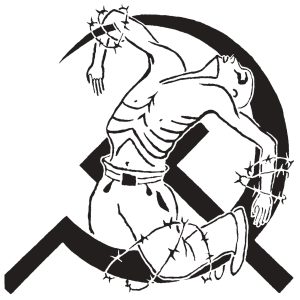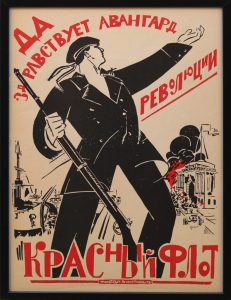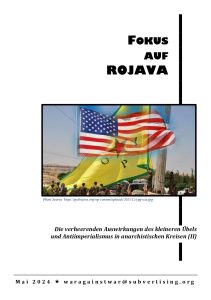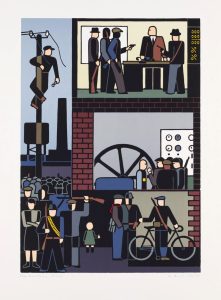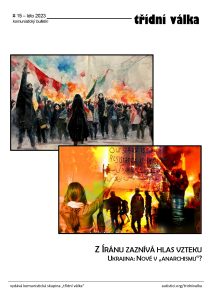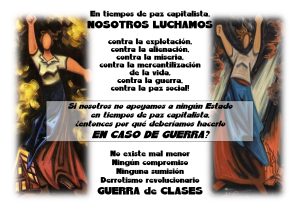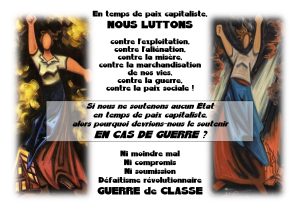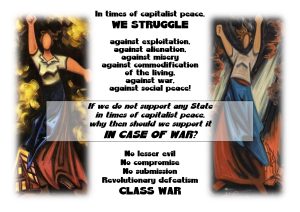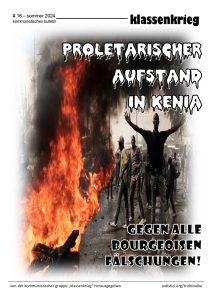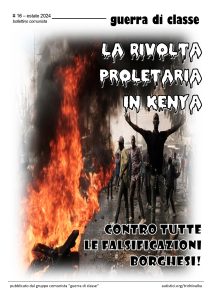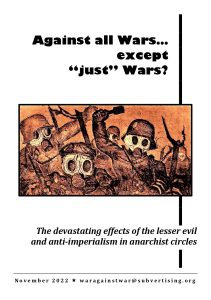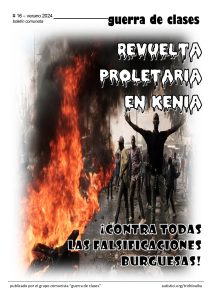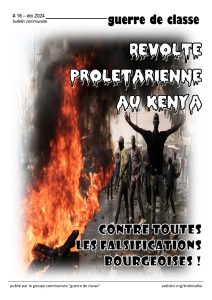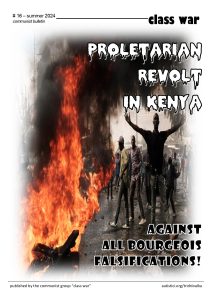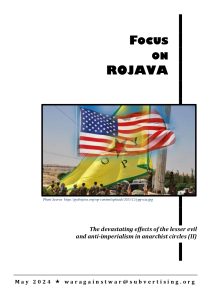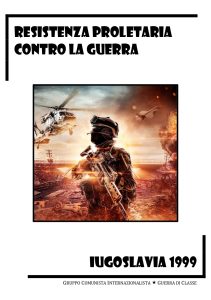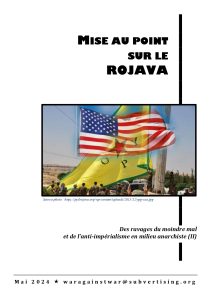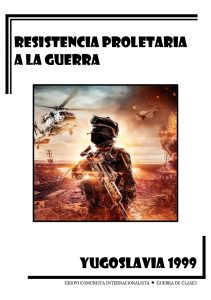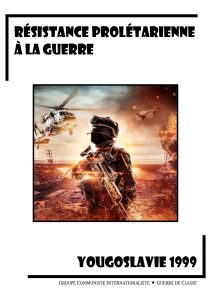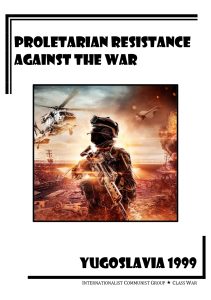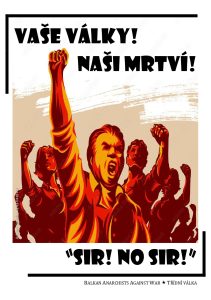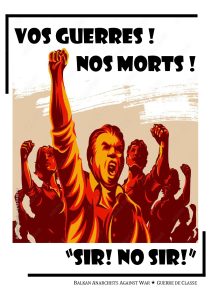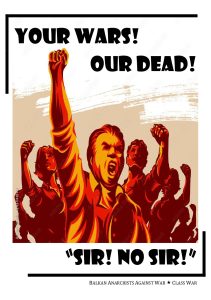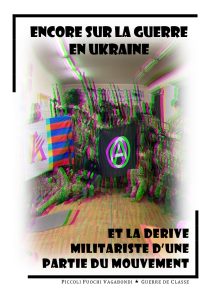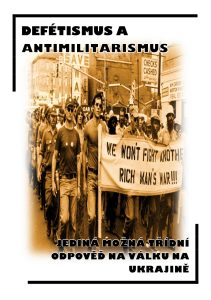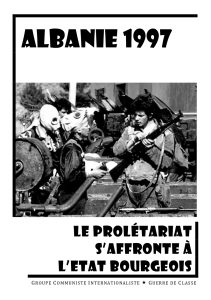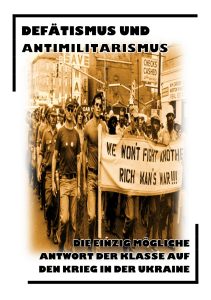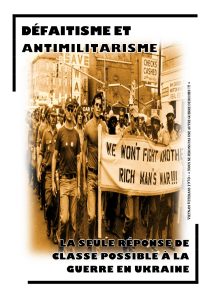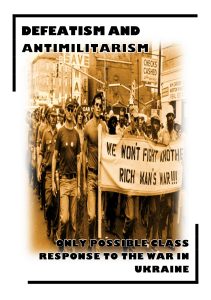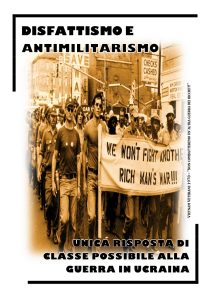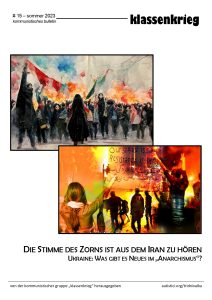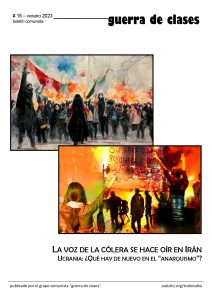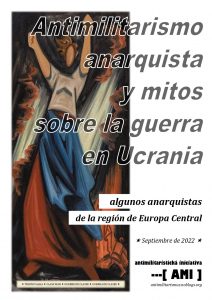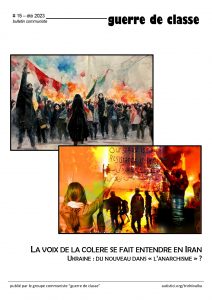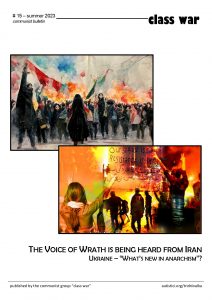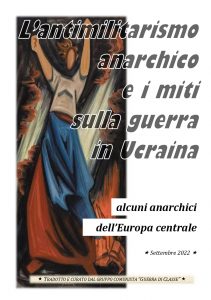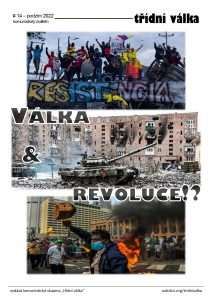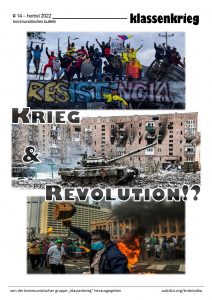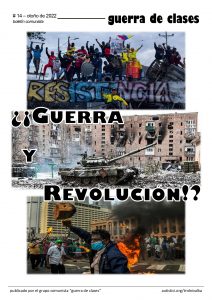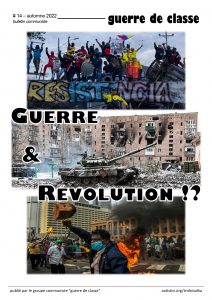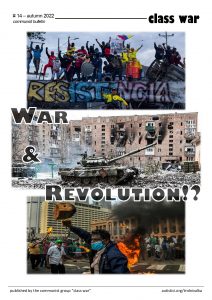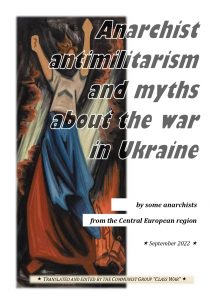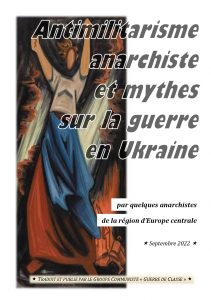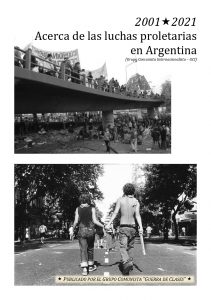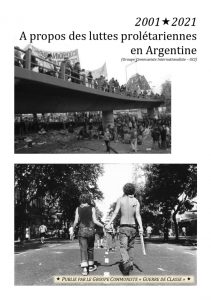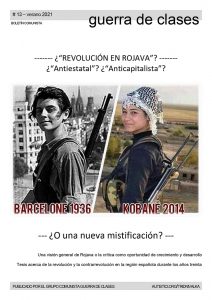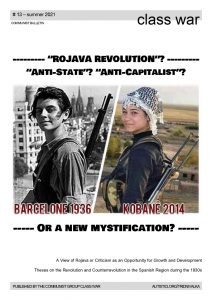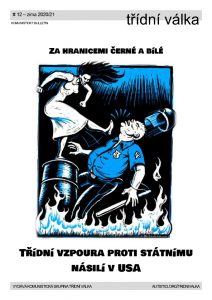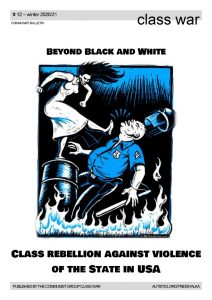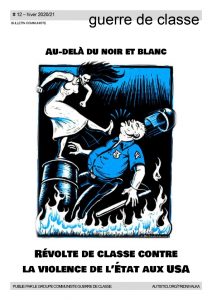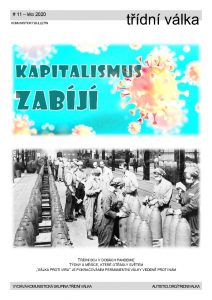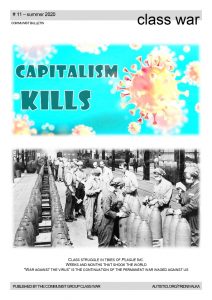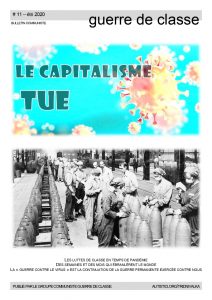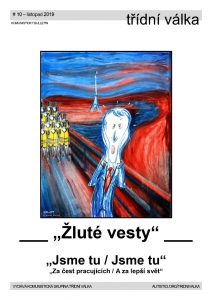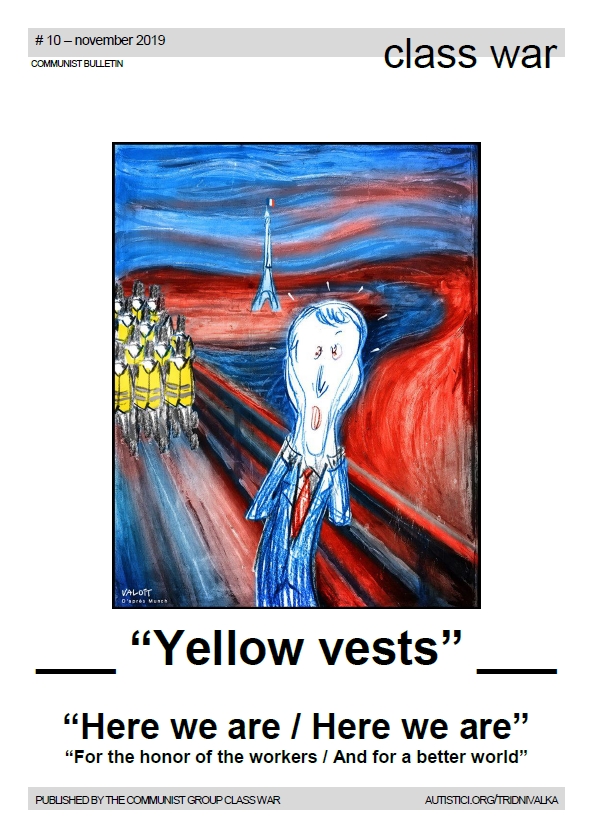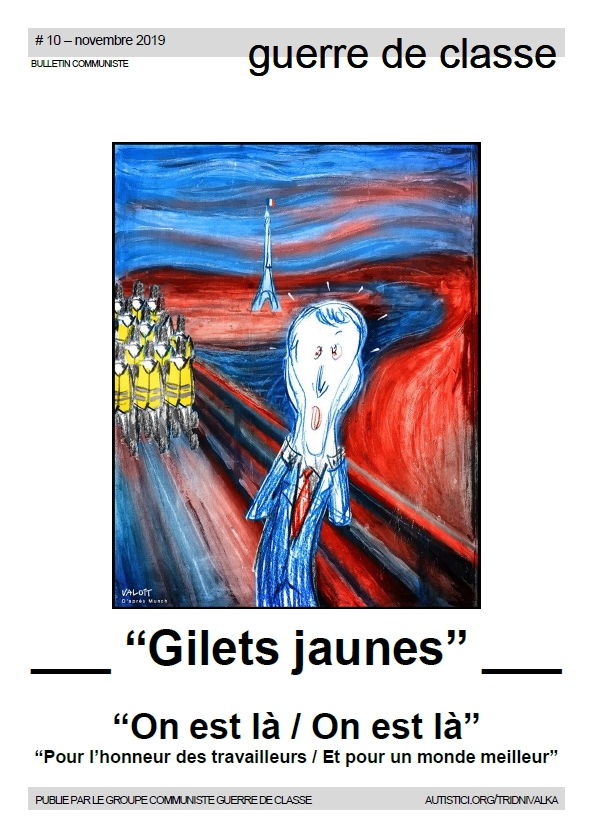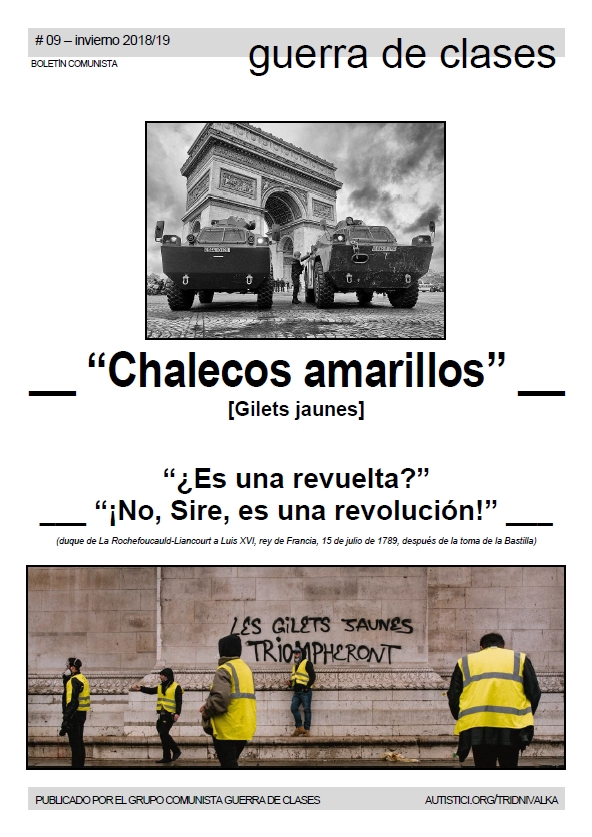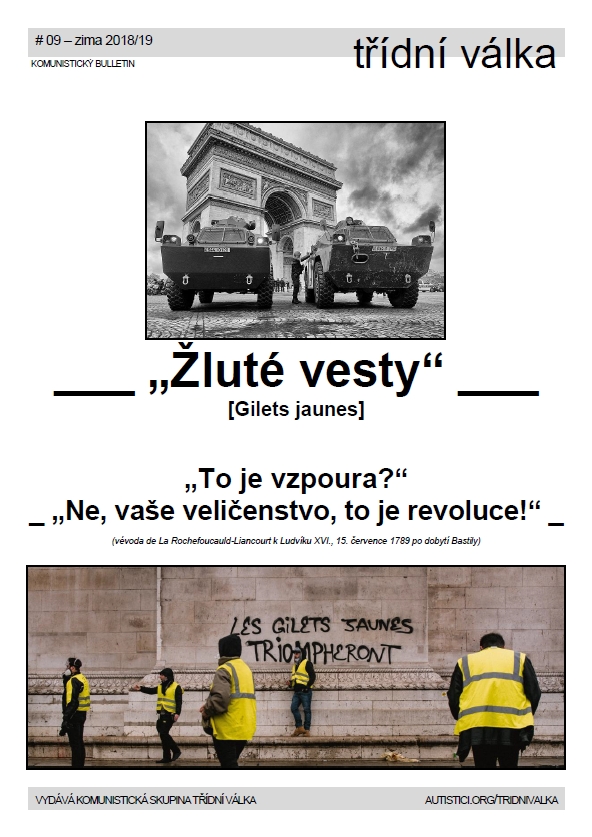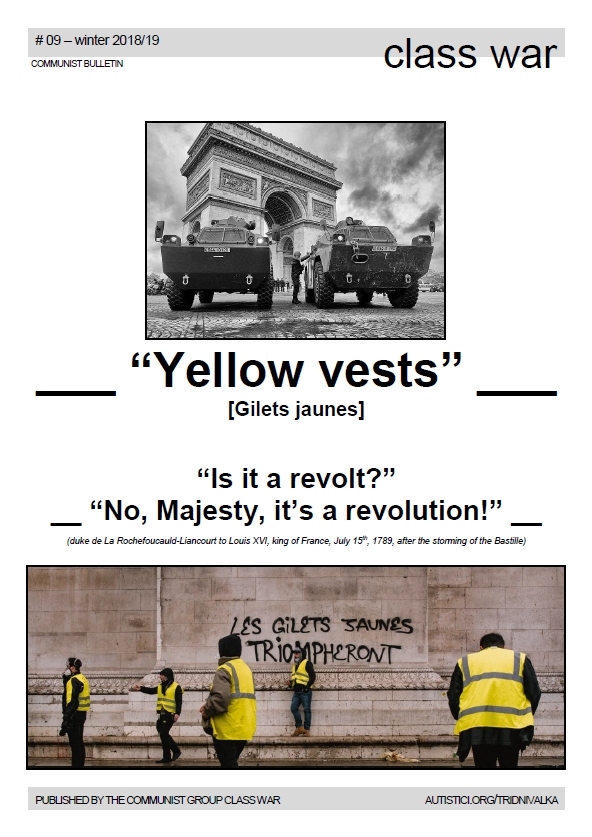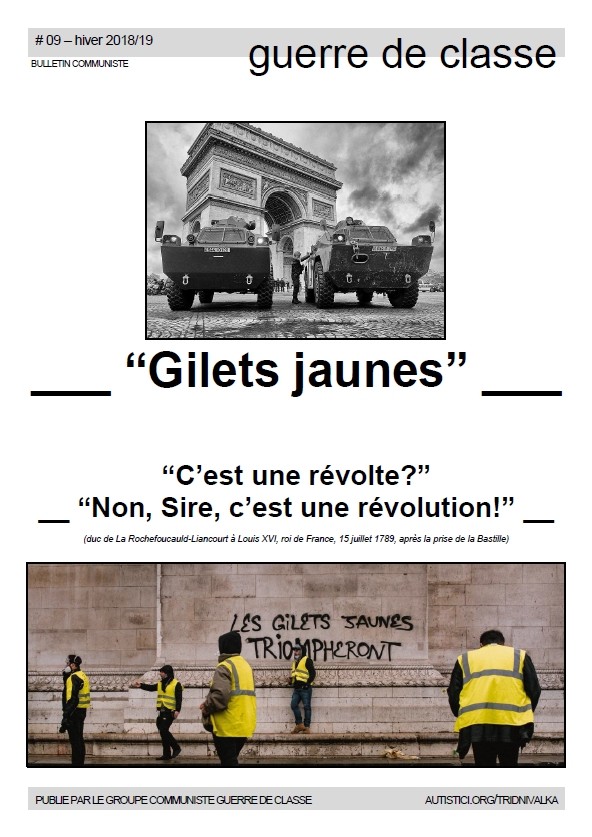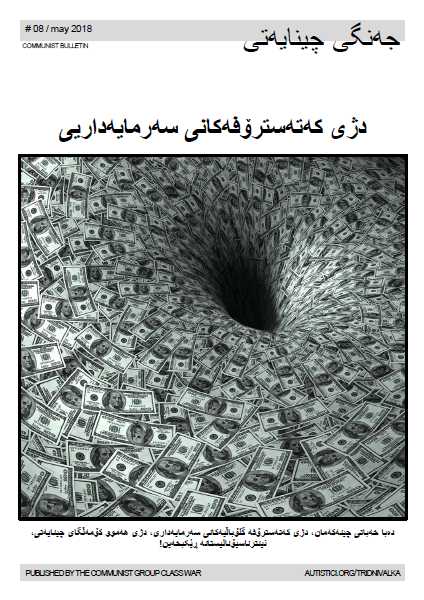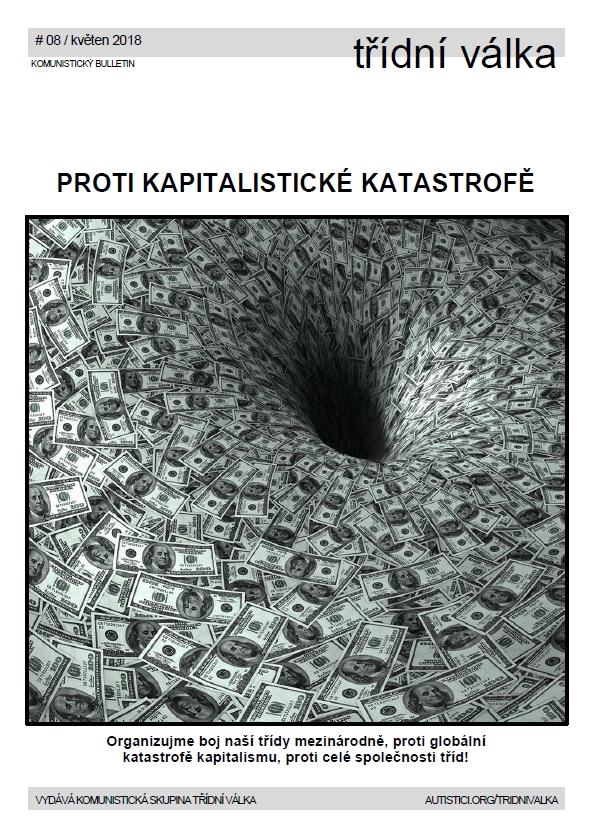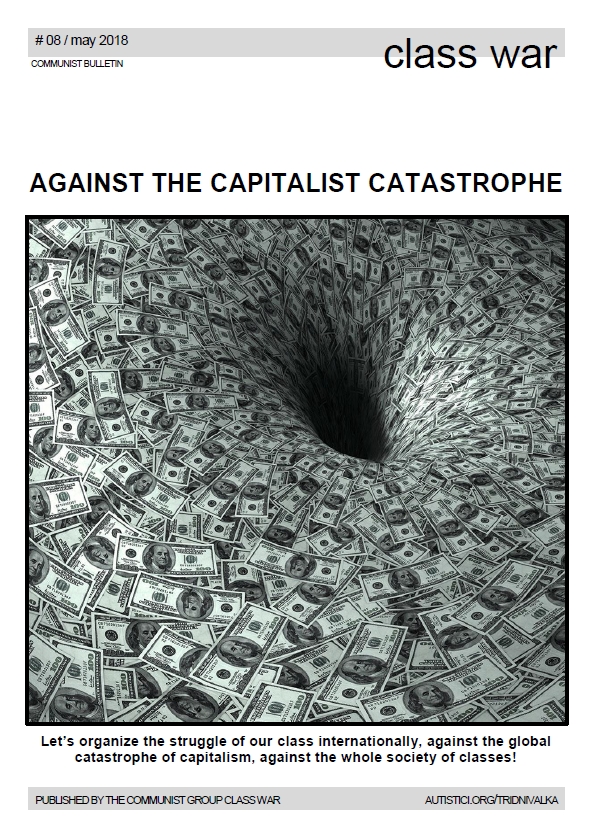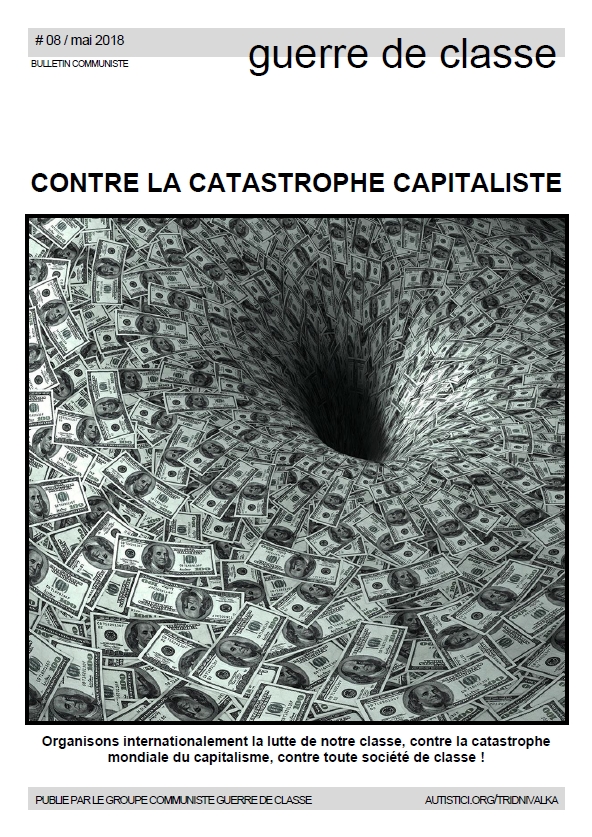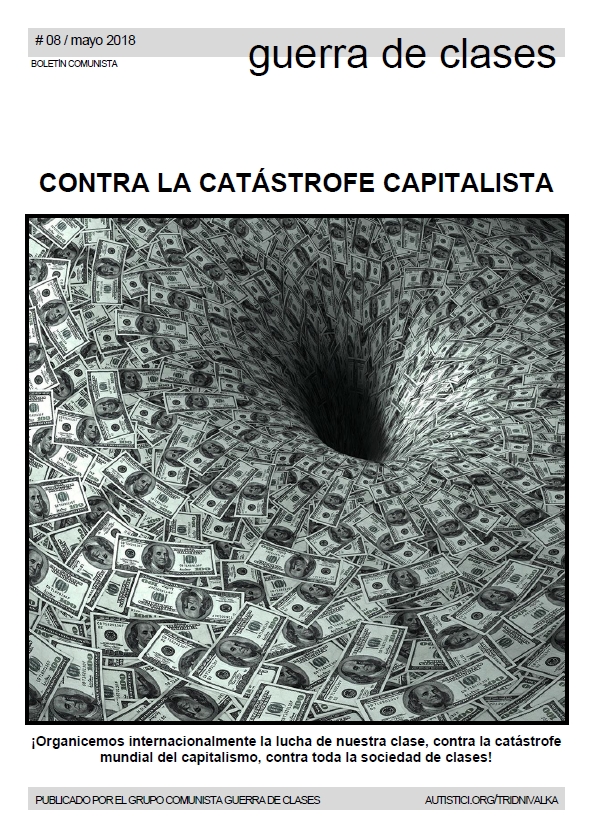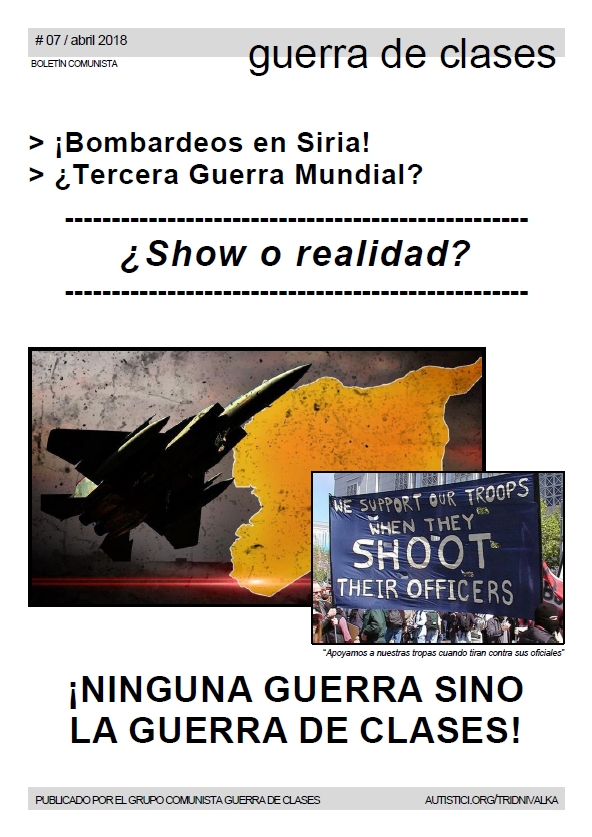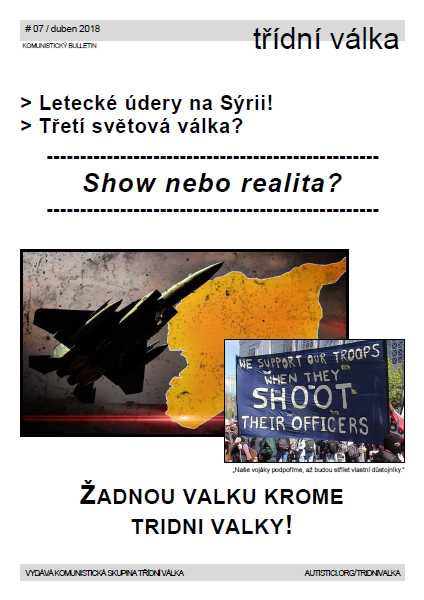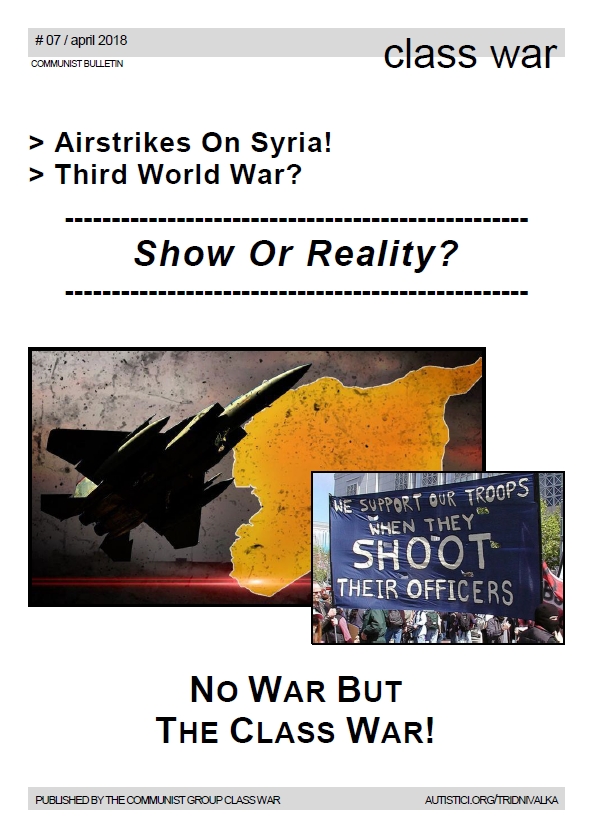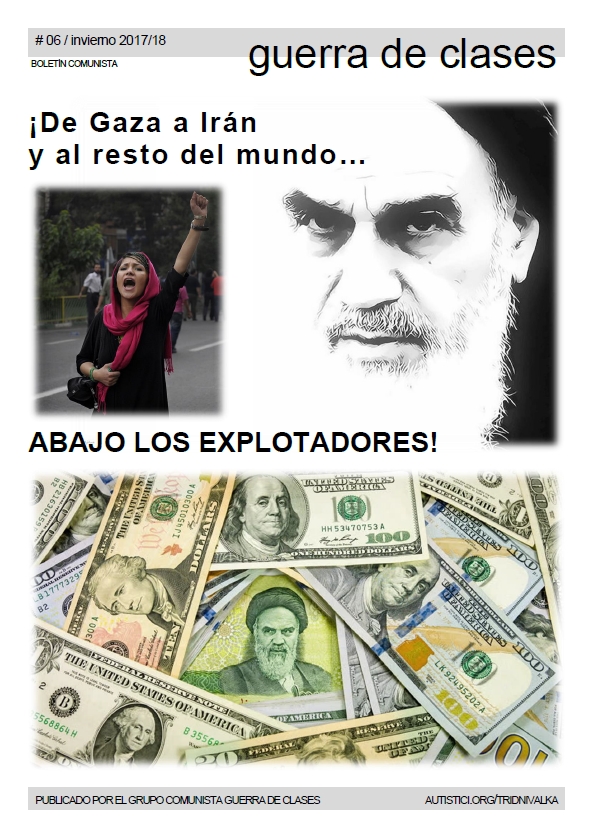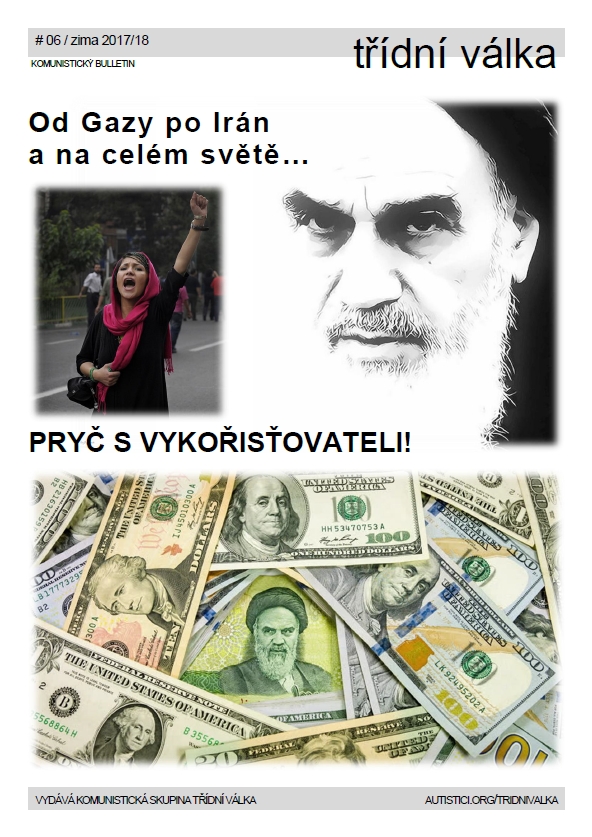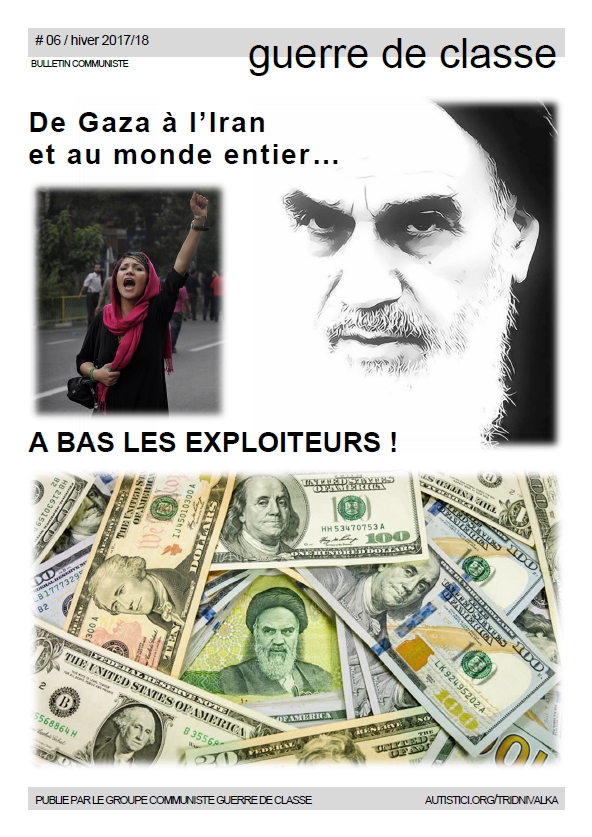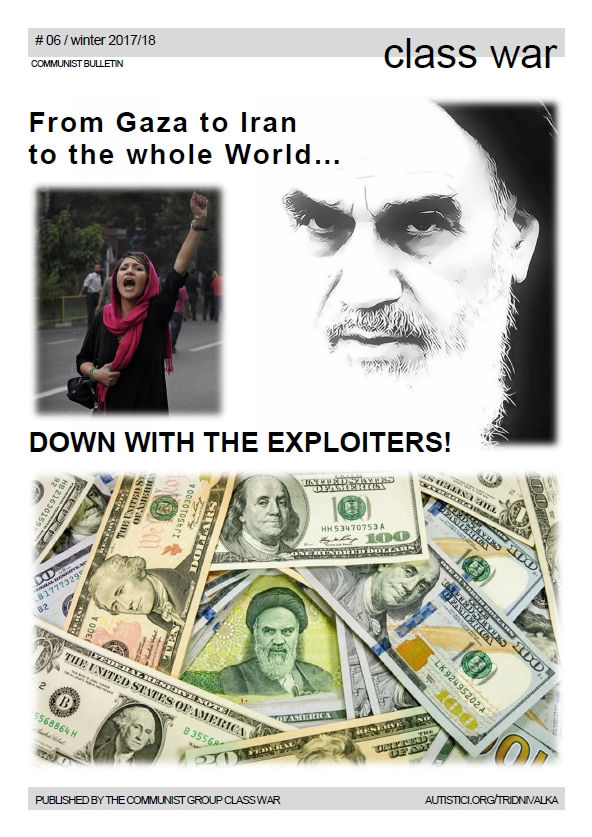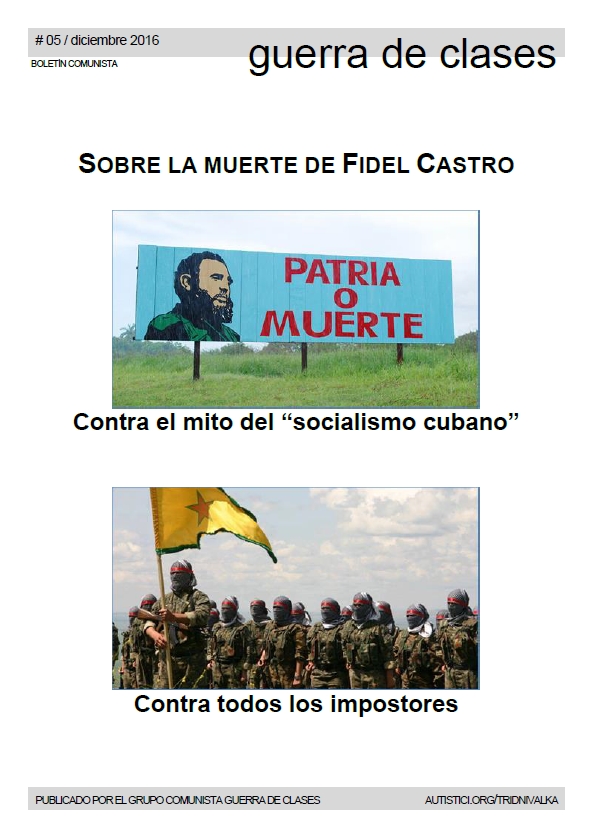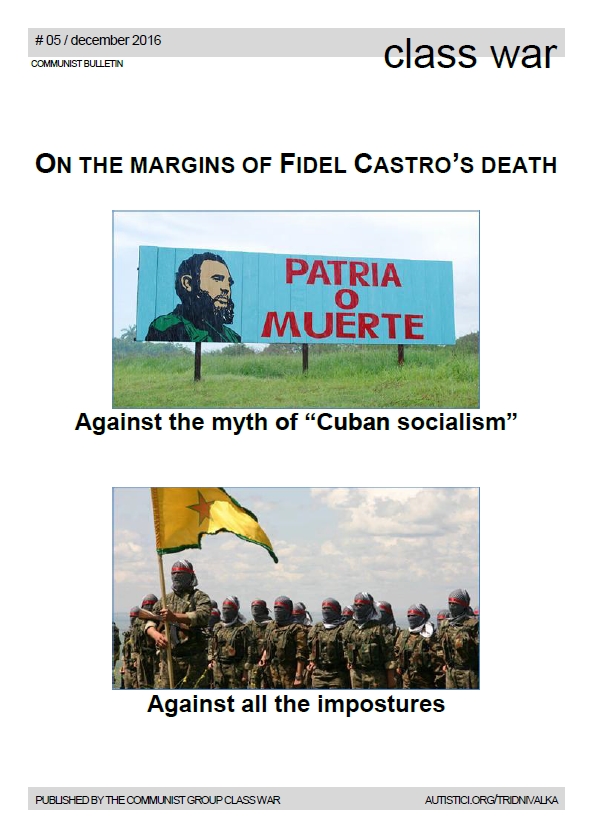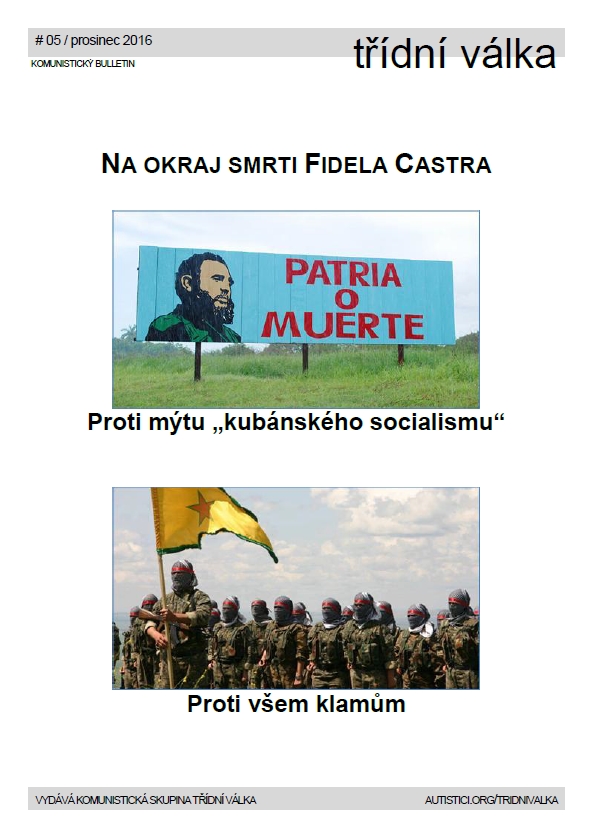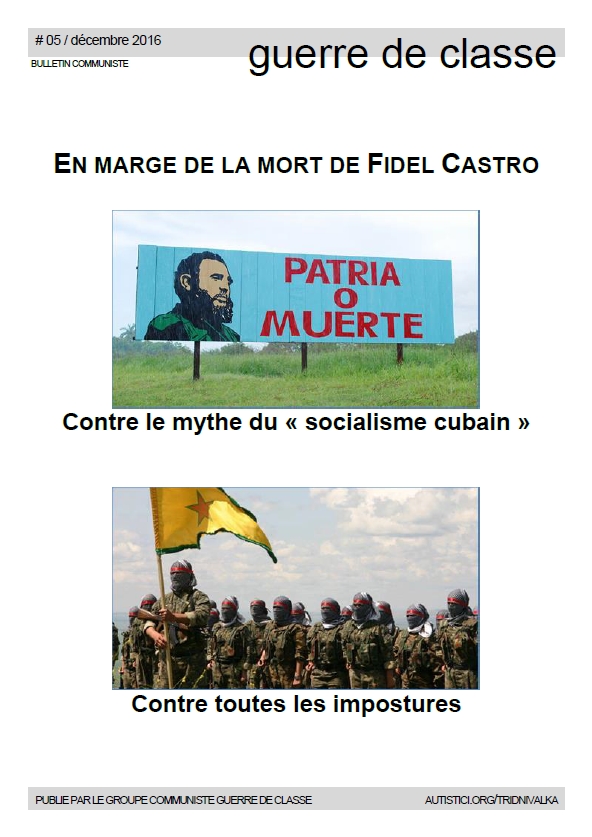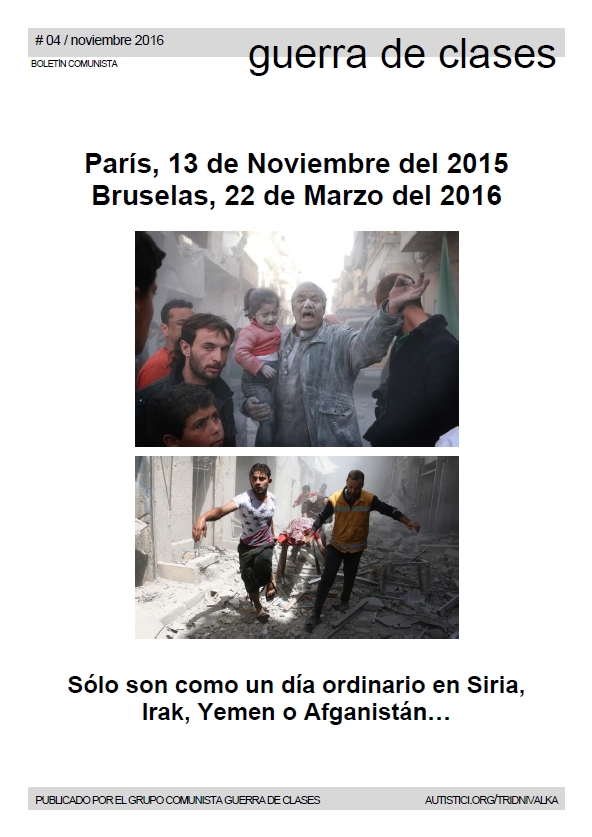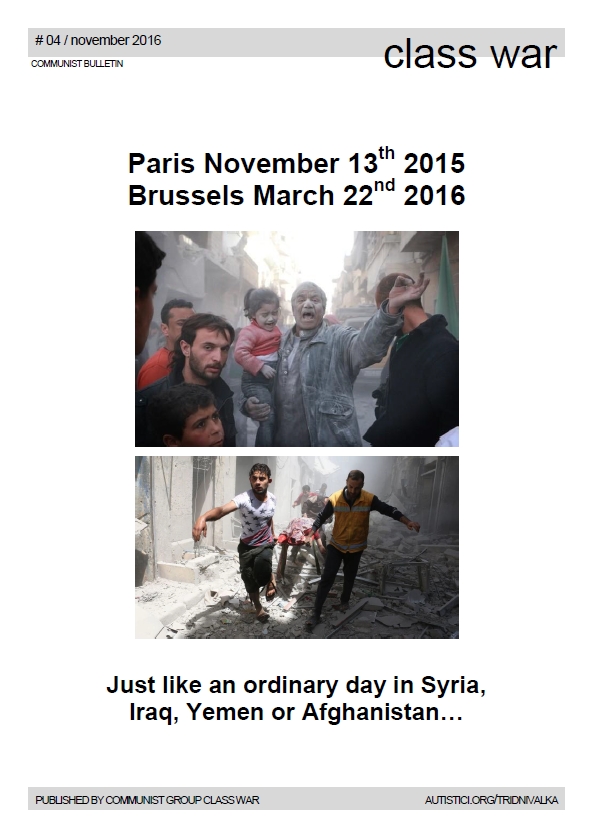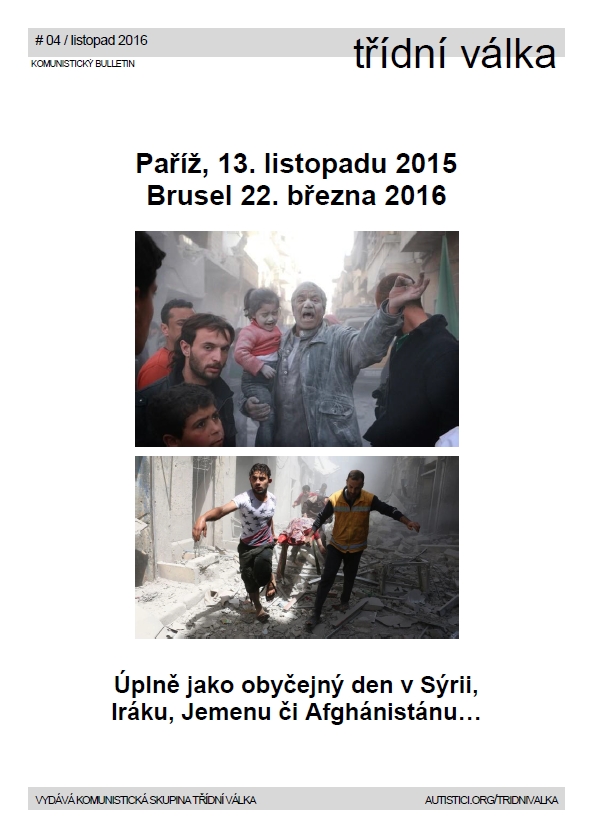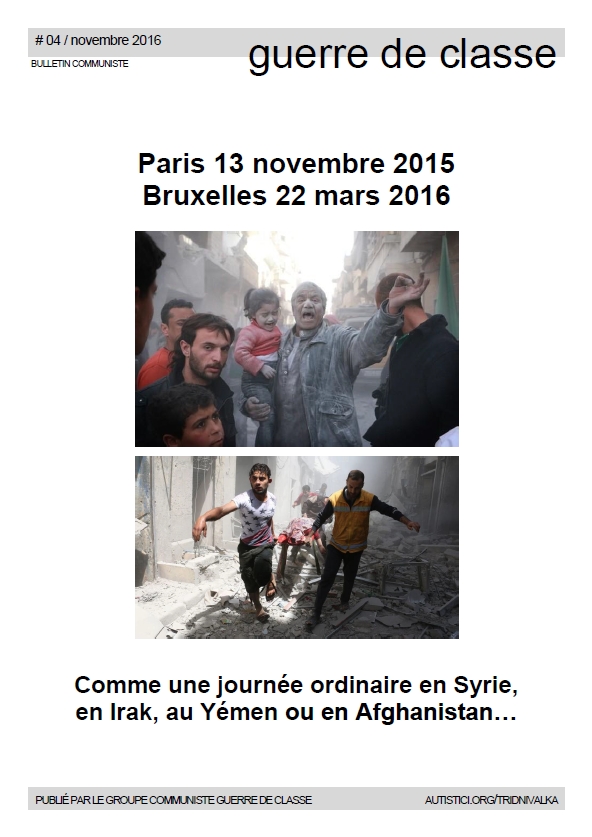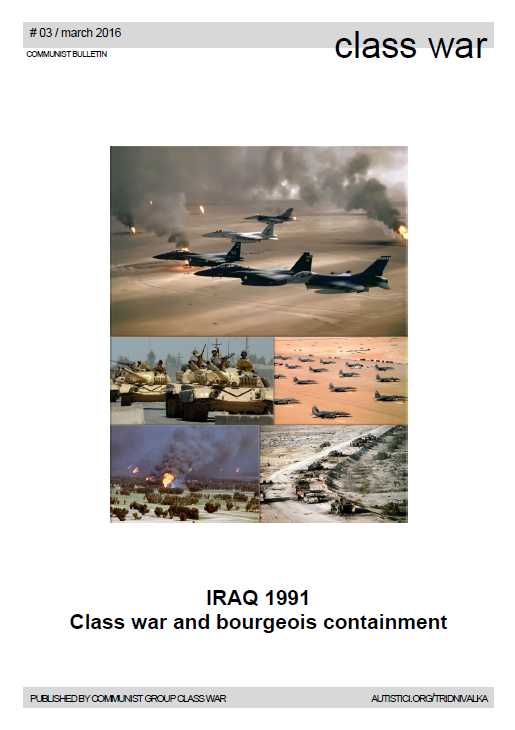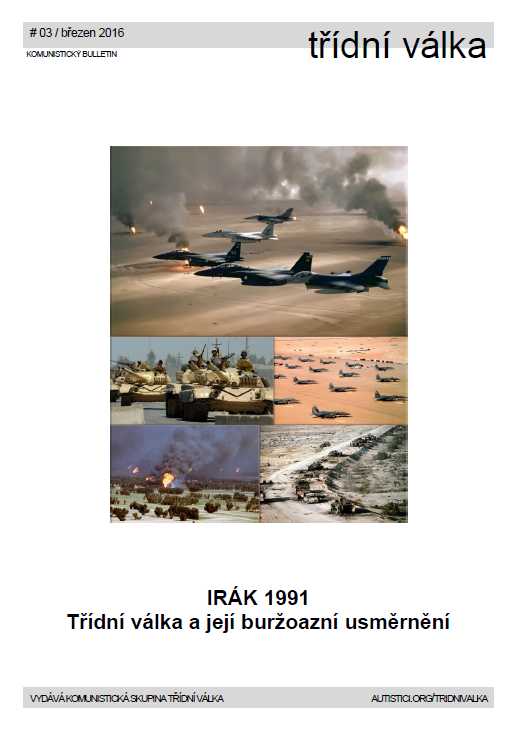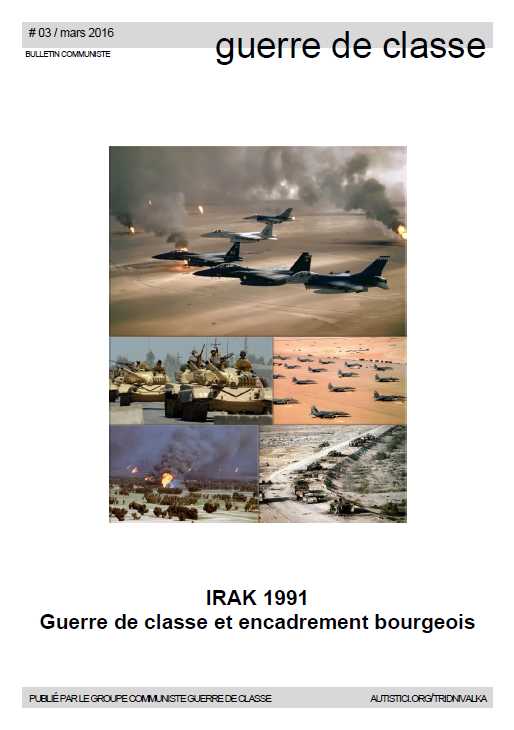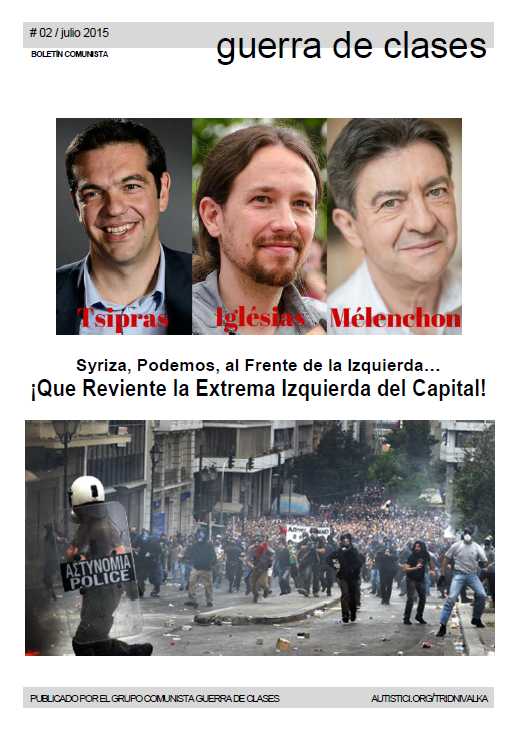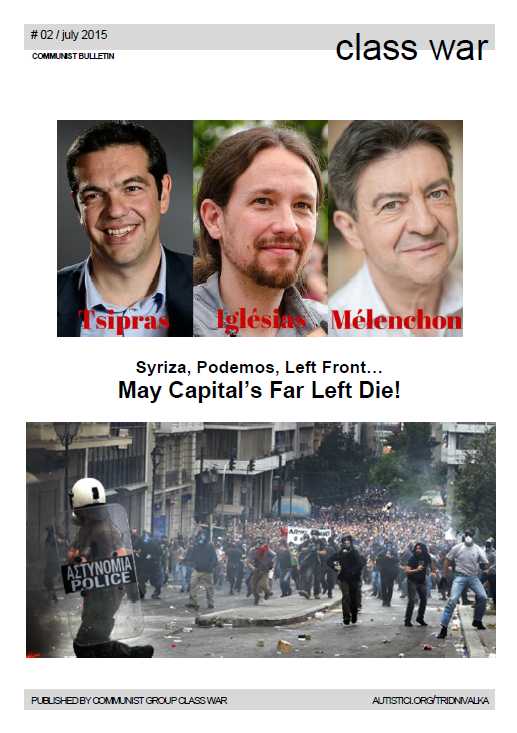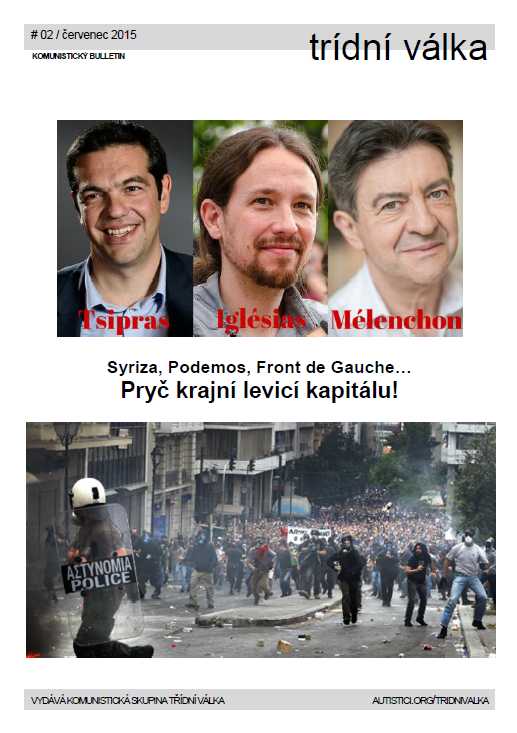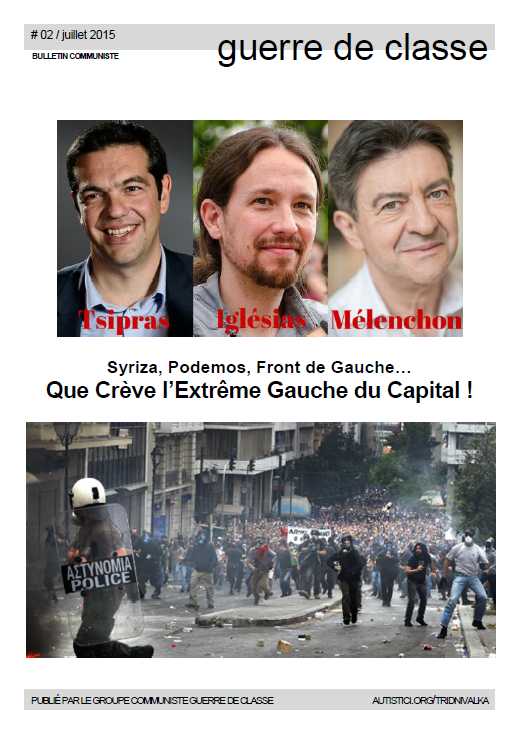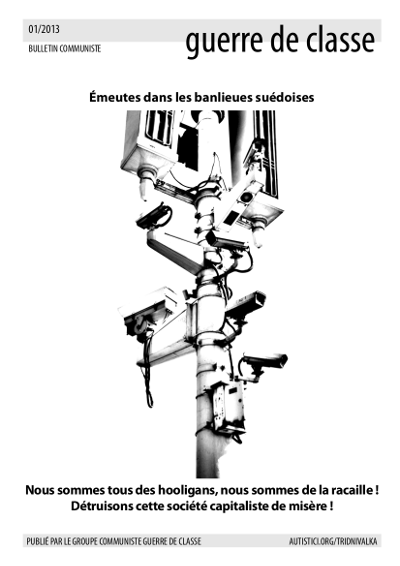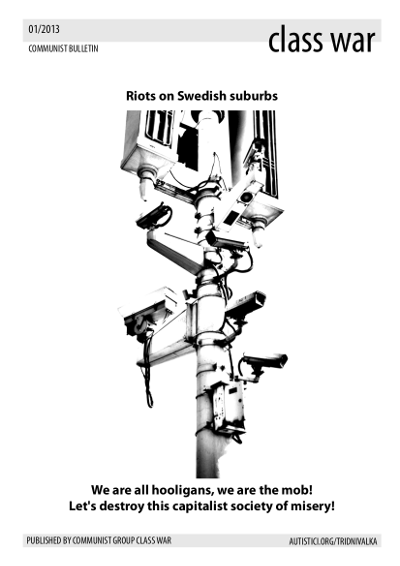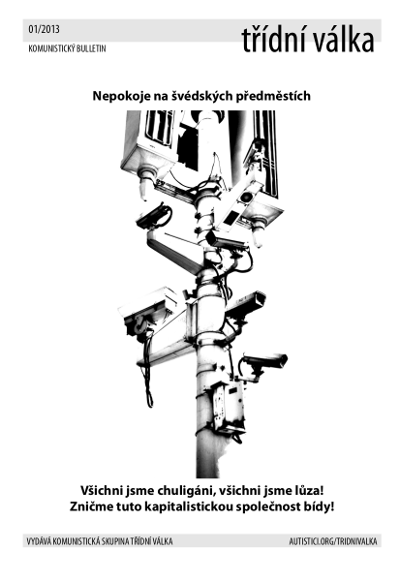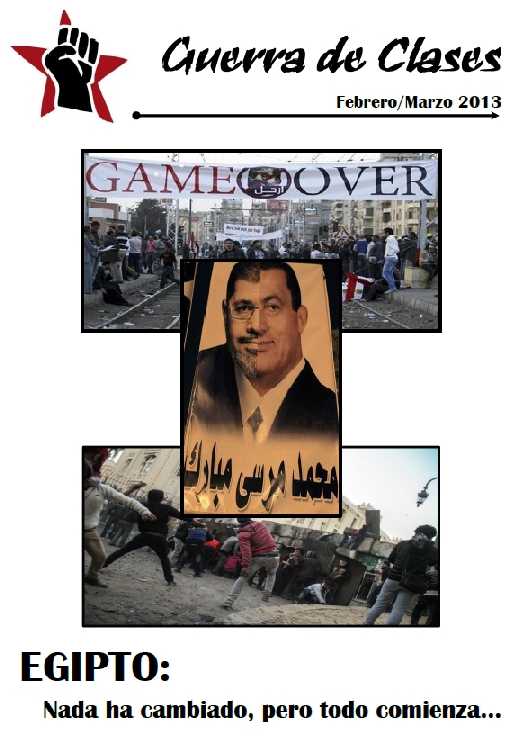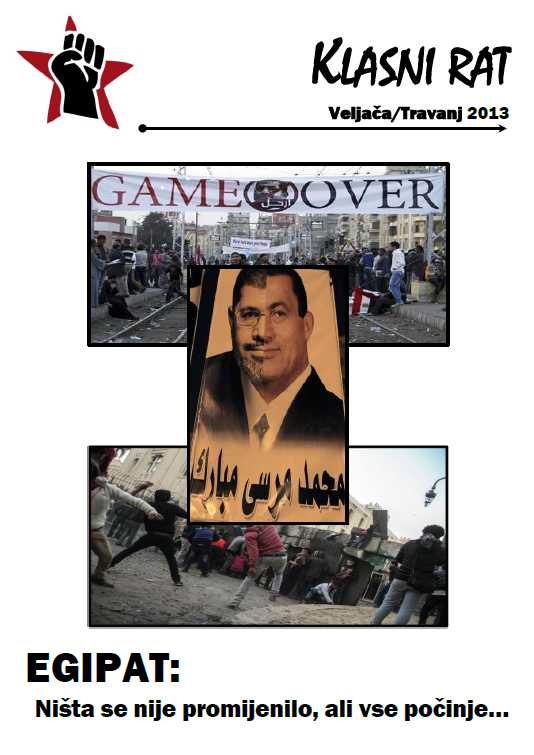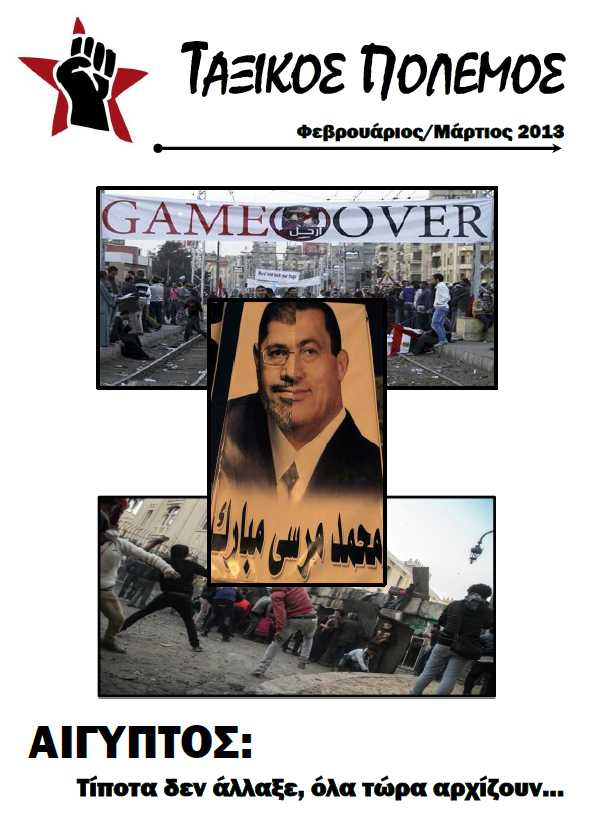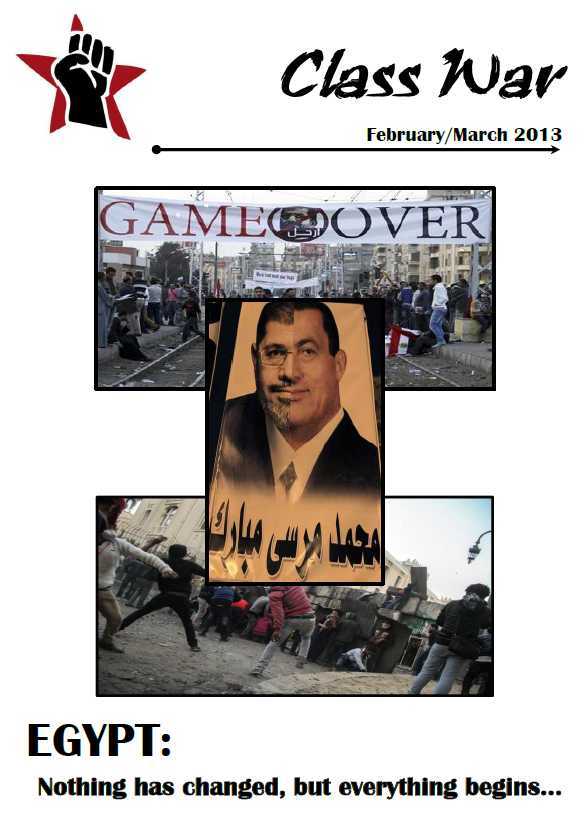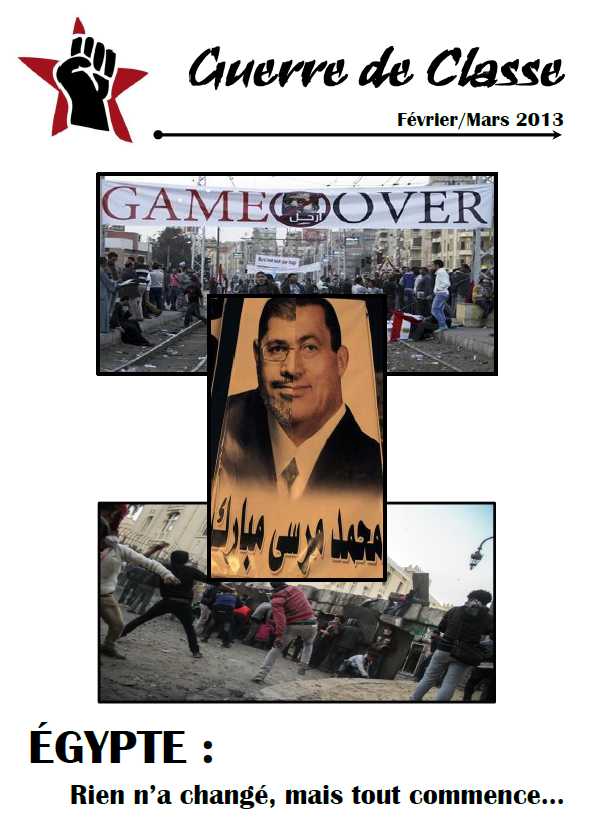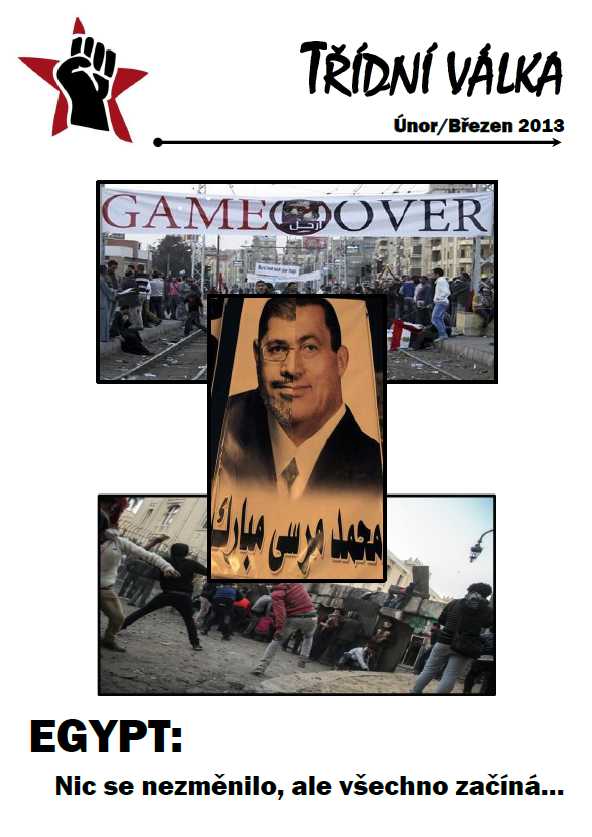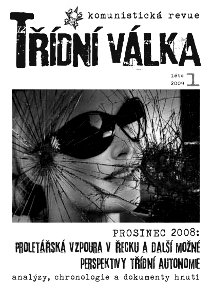/ Español / English / Français / PDF /
We received, we translate and publish (text for discussion)

/ Class War / Below you can read the contribution from the comrades of Proletarios Hartos de Serlo [PHS] [“Proletarians Fed Up to Be”] from the Ecuadorian region to the discussion on revolutionary defeatism. Though there are points we would like to develop further or we disagree we find the text very inspiring and providing good material on how to develop the discussion on the revolutionary defeatism and all its practical consequences.
One of the important points of the text is the discussion on the invariance of revolutionary defeatism. We would like to clarify, that if we talk about “invariance” of revolutionary defeatism it is first of all to put this position in opposition to the revisionism in order to underline the continuity and determination of the proletarian struggle. We have been witnessing a new wave of such revisionism represented by various sects of social democracy (Leninists, “anarchists”, etc.) as for the position against the war. Based on reinterpretation of the fundamentals of the capitalist war, on the alleged different reality of a particular region, on a “different nature” of bourgeois State of the Ukraine or Palestine, those groups consequently call for a different proletarian struggle and different practice, goals, interests, tactics… They try to make revolutionary defeatism conditional, applicable in some situations and not others, a position to be discussed according to circumstances.
So yes, it is in opposition to such positions we claim that the revolutionary defeatism is an “invariant” position of the proletariat against the war, not because “the historical communist left says so” but as it has always been the only possible reaction of our class to the bourgeois massacre, because this is what we have learned from the historical practice of the proletariat.
Let’s also underline that for us the revolutionary defeatism is “invariant” as for the content, but not as for its forms, concrete actions, methods and tactics, because these obviously depend on different material conditions of the proletariat in this or that bourgeois war, this or that concrete situation.
However, we agree with the comrades of PHS that the ideology of “invariance” as it has been put forward mainly by the self-proclaimed“communist left” has indeed not much in common with dialectic materialism. The communist programme was not written once and forever by some “genius” party leaders bringing the consciousness to the proletariat (always from outside, cf. Kautsky, Lenin). On the contrary, it is a result of a synthetisation, abstraction and generalisation of the proletarian practice, of its struggle against exploitation. And if it is so, it continues to be developed, clarified, theoretically and practically formulated.
For us the revolutionary defeatism is based on the fact that proletariat has no homeland and this motto is the essential and unchanging thesis of the communist movement determining all the possible practical directions. This fact was not invented by any “prodigious” theoretician, it is not something external to our class, that we should make it “understanding”, that we should “teach” the proletariat, because it expresses the reality, the practice of the proletariat and this was the case even before it was formally expressed, theoretically elaborated by communist militants.
The proletariat is a historical being, which defines itself by its practice in opposition to bourgeois nations, States (to The State!) and the entire bourgeois mode of production. Its very existence is in opposition with nations and States. Its very existence contains the seeds of the abolition of all nationalities, all borders, and all States. The revolutionary proletariat exists as a negation of capital, as its gravedigger and all its programmatic tasks are negatively contained in capital itself.
While resisting to different bourgeois attempts to draw it into war massacres, while refusing to be turned into cannon fodder, while fighting against war economy sacrifices, the proletariat, if acting for its real interests and not for the interests of the bourgeoisie, always expressed revolutionary defeatist positions, without even knowing that they were theoretically developed by different militants and groups.
So, for us, it is not this or that theory that confirms the revolutionary defeatism as the right and only reply of proletariat to any bourgeois war. On the contrary, we as communist, we draw lesson of revolutionary defeatism from the proletarian practice. And this lesson, our understanding of the practical manifestation of this struggle, our attempts to abstract and generalize concrete expressions of this struggle and to place them in the framework of the revolutionary project of our class, are necessarily never perfect, never complete, and this will be so until the realisation of the revolution.
In other words, the antagonism between capitalism and communism is “invariant”, it is permanent. Capital is a worldwide reality, communism is a universal movement, and internationalism is a decisive element in the practice of the proletariat. Our attempts to express it theoretically are necessarily imperfect and unfinished, confused or sometimes simply wrong. Therefore, our task is to clarify them, to develop them with the purpose to head towards the transformation of bourgeois war into class war, towards the victory of communism, the construction of human community. This is the contradiction between the “invariant” program and the constantly evolving theoretical theses of the communists.
This brings us to the question put forward by the comrades of PHS on the role of the revolutionary minorities, on what we can and what we should do in the current situation in order to support the development of revolutionary defeatism. We indeed agree with the text that it is a crucial issue that we should continue to discuss and develop, despite all the difficulties we have been going through, among our community of struggle, with radical proletarians in rupture with capitalist ideology of bourgeois peace and war.
CW.
/ PDF /
(Self-)critical reflections on revolutionary defeatism today
Source in Spanish: https://proletariosrevolucionarios.blogspot.com/2024/07/reflexiones-autocriticas-sobre-el.html
Presentation
We decided to publish this unpublished text for two reasons. 1) Because the Action Week in Prague and its mailing list, to which we first sent it two months ago (last weeks of May 2024) are already behind us.1 And 2) because it received a couple of critical comments from comrades in other regions with their respective response from us via correspondence. That is to say, it generated an internationalist debate (still ongoing) on revolutionary defeatism around Palestine and Ukraine, which we hope will help to revolutionary proletarians everywhere today and, in turn, will bring other contributions. It should be added that, being an ongoing debate, this is still semi-finished material.
On the other hand, the slanders that, under the pretext of these critical reflections, were made against us by another pair of despicable individuals who are standard bearers of the communist left have no place within this debate, but we only mention them separately to differentiate and distance them from it. Because, just as we are in favor of the debate as a tool for clarification and advancement of revolutionary praxis, so we are against slander as a counterrevolutionary practice, whoever it comes from.
Both are taking place in material conditions of existence and class struggles with more differences than continuities than those of a century ago, mainly due to the high degree of development of the productive/destructive forces of capitalism, the deepening of the real subsumption of labor to capital and the crisis of reproduction of the class relation, plus other non-economic factors that are important today (ecological, geographic, historical, political, national, ethnic, gender, etc.); a world-historical context of catastrophic crisis and capitalist counterrevolution; the world bourgeoisie in decline but on the offensive and increasingly genocidal (and ecocidal); the world proletariat increasingly numerous, young and educated but in precariousness and on the defensive, or rather, defeated, weakened, isolated, disorganized and confused as an antagonistic class; and, therefore, a need for defense and, at the same time, for a rethinking of proletarian internationalism and revolutionary defeatism against capitalist war and peace, on the part of its radical minorities.
Revolutionary defense and rethinking without nostalgia for the past, without illusions and without sectarianism – unlike the communist left – so that it is not a sterile dogma or a “Don Quixotism”, but a position, a perspective and a practice with sufficient power to resist and overcome the relation of forces currently unfavorable to the world proletariat. Having clear that the latter will be the work of the dynamics and the historical evolution of its own current struggles and of no one else.
* * *
Without nostalgia for the past, without illusions and without sectarianism, we hope that our materials2 will be of some use for reflection, discussion and collective action for real proletarian internationalism and revolutionary defeatism, in the present and the future.
No nostalgia for the past
Because, according to the comrades of Vamos Hacia La Vida (Chilean region) in one of their last texts on Palestine,3 proletarian internationalism and revolutionary defeatism are no longer and cannot be the same as those of a century ago, for the simple fact that the material conditions of capitalism and class antagonism are no longer the same. In this historical materialist sense, they are not invariant.
After the “Second World War”, and above all after the crisis and restructuring of 1975, world capitalism passed into the phase of real subsumption or real domination of capital over labor and society as a whole, the reciprocal implication between capital and proletariat, and the workers’ movement itself was destructured by automation and financialization. Since then, the labor/capital relation is in structural crisis: the proportion of living labor or variable capital – the only source of value and surplus value – is decreasing in relation to the proportion of dead labor or constant capital – mainly, high technology. Consequently, there is a fall in the rate of profit and devalorization. This is the material core of the long capitalist catastrophe today.
What happens is that the logic of the capitalist mode of commodity production – produce for the sake of producing value and accumulate for the sake of accumulating capital – is catastrophic: it can only exist at the cost of relentless depredation of nature and the working class. Catastrophe is not the exception, it is the rule. Capitalist progress is catastrophic. Its greatest success is its greatest failure. More clearly: the historical development of capitalism, inseparable from class antagonism, produces the material conditions of its own dissolution. In the Grundrisse and Capital, Marx foresaw this systemic tendency or this future of capitalist society. And the future is today.
Consequently, capitalism today is like a corpse walking around with artificial respirators: financial capital, wars, drug trafficking, pandemics, etc. Thus, expanding and aggravating its catastrophe. The capitalist counterrevolution is the increasingly violent State – and parastatal – administration of this catastrophe, mainly to prevent or, failing that, to quell any hint of proletarian revolution, as have been the revolts and insurrections so far in the 21st century. Because capitalism will neither die nor bury itself. The proletariat is the gravedigger of capitalism… and of itself as an exploited and dominated class to become a real community of individuals freely associated in order to develop and live all their potentialities, in balance with nature.
For its part, the majority of the proletariat is no longer the factory working class or the industrial proletariat (which, by the way, is “the eternal absentee” in the current struggles but which “would solve everything”, according to nostalgic workerists, including some “left communists”), but a global intermittent proletariat in all sectors of the economy – from agriculture to services – surrounded by a redundant or surplus proletariat. Therefore, this is the epoch of the world reserve army. Hence, when the proletariat – waged and non-waged – today fights capitalist exploitation in its different forms, it also questions itself as a class; and, that the revolts of this century end up being struggles without demands, since there is no longer anything to demand or improve within capitalism, but a new society through communist revolution is necessary.
Indeed, from the perspective of materialist dialectics, far from making concessions to capitalist realism (“it is easier to think of the end of the world than the end of capitalism”) and to social democracy, the material conditions, the catastrophe, the counterrevolution and the current struggles determine that the world communist revolution without transitions or mediations or, to be more precise, the immediate abolition of capital, labor, social classes, the State, the market, national borders, wars, etc., is more necessary and possible than ever before. (By the way, immediate does not mean instantaneous, but without mediations. That is why the immediacy of communism should not be confused with immediatism.)
The present historical period is the period of the revolution conceived as communization as produced by overcoming of the present cycle of struggles – abolition of class society, starting with the proletariat itself – and of the World Commune understood as the centralized global network of regional and local communes, neither Statist nor mercantile. Communes that will be the result and the condition of an insurrectional movement on a global scale. The communist revolution is the product of the insurrection and the communization which take place in unison or it is nothing. Everything else is a capitalist counterrevolution, even if it is disguised as “the revolution”.
Moreover, considering that the global ecological catastrophe is devastating the planet and seriously threatens the survival of the human species, the revolutionary slogan of this epoch is no longer “socialism or barbarism” – as formulated by the revolutionaries of a century ago – because socialism proved to be a historical variant of capitalism and because we already suffer from capitalist barbarism or catastrophe day after day. It is Communism or Extinction.
This is the current real context in which capitalism develops, class antagonism and, therefore, the revolutionary actions and positions of the proletariat such as internationalism and defeatism in the face of the war in Ukraine and Palestine.
No illusions
Because we must be aware that, due to the counterrevolutionary character of the current world-historical context, transforming the imperialist war into international revolutionary class war is today not the order of the day, so defending the positions of internationalism and revolutionary defeatism is, everywhere, a minority struggle, against the current and ineffective in terms of changing the balance of social forces; that, for this very reason, it is a struggle that implies much courage, fortitude and temperance on our part, or rather, much proletarian intransigence, both against the right of Capital (imperialism, chauvinism, Zionism, fascism, warmongering, etc.) as well as against the left of Capital (anti-imperialism, national liberation, anti-fascism, liberalism, pacifism, etc.); and that, in spite of this, we are neither alone nor mistaken, comrades: that is why initiatives like this one exist to build a stateless community of revolutionary defeatists.
In other words, revolutionary defeatism today is not an offensive position, but a defensive position, given that in the global relation of forces the proletariat is on the defensive with respect to the permanent offensive of the world bourgeoisie.
No sectarianism
Because the above does not mean locking oneself up in a sect or ideological-political ghetto. That would be to reproduce “from below” the mafia logic of capitalism, as has already been done by some “left communist” and “anarchist” organizations that not in vain have not been invited to this meeting, since they only seek to indoctrinate and recruit followers – just like the religious sects of “the end of the world” and “the second coming of Jesus Christ” – but not to weave a community of internationalist struggle that is historically operative and relevant.
As you rightly say in one of your documents: “We know that revolutionaries cannot in any way create anti-war movement. They cannot (and do not want to) bring any consciousness to the proletariat, because it can only arise from the material conditions in which the proletariat finds itself and from the struggle of our class against these conditions.”
It is in that sense that we affirm: sooner or later, only the same capitalist catastrophe and the ongoing global class struggle will make it feasible to transform the imperialist war into world social revolution; only that dialectical movement of the present reality will produce a revolutionary conjuncture where the communist minorities can really influence the massive insurrection and a communization of all that exists in the whole world. Struggle is the way.
What to do? Along with sharpening our theoretical and organizational weapons, strengthening our networks of solidarity, communication and agitation in the heat of the current concrete struggles of the proletarian masses – with their limits and their forces – and in order to contribute to produce the generalized revolutionary rupture is a vital part of that way.
Why? Because, as you yourselves state in the document of the Congress Against War (March 2024), “current manifestations of resistance, however contradictory and fragmented they are, undoubtedly contain the seeds of a social polarization that can turn wars between states into class confrontation.” Because the proletariat is its struggles and it is a contradiction in process (e.g. the Intifada in Palestine). Because mass action is much more important and determinant than group ideology in order to criticize and overcome such contradiction, as well as to confront capitalist war and peace (e.g. the networks of deserters on the Russian-Ukrainian border, the actions of blockade to the international arms trade by dock workers, the seizures of Universities in the USA and other countries by their students and professors, etc.). Because communism is not an ideology, but a real movement that subverts the existing conditions, even if its protagonists do not mention the word communism or anarchy. And because, as Marx rightly said, a step forward of the real movement is worth more than a dozen of programs… and congresses.
Last but not least: why are these (self-)critical reflections necessary? Because the proletarian revolution either criticizes and overcomes itself or stagnates and degenerates into counterrevolution.
Fraternally,
Proletarios Hartos de Serlo
[Proletarians Fed Up with Being Proletarians]
Quito, May 19, 2024
* * *
INTERNATIONALIST DEBATE (ongoing)
Critical Commentary fromAn Internationalist Comrade from the Spanish Region (June 2024)
“As usually, they take for defeatism what it is not and hence it can be variant. How can defeatism not be invariant, that is to say, the struggle against your own bourgeoisie, your own exploiter. How it is not invariant in Palestine; the struggle against its own State (State of Israel), its own bourgeoisie (combination of Israeli bourgeoisie and Palestinian subcontractors – read PNA or Hamas). How could defeatism not develop in this way. Its corollary (confraternization of armies) is confused as if it was the whole and furthermore the moments of the imperialist war (front, gendarmerie and occupation war) and the moments that reciprocally imply defeatism are not even understood.”
Critical Commentary by Tridni Valka / Class War Group of the Czech Region (July 2024)
“We believe (unlike you) that revolutionary defeatism as a proletarian practice and as a programmatic position drawn from it is and has to be the same. It is important to point out that the essence of capitalist war remains the same. Whatever the different ideologies try to persuade us, all wars are first of all wars against proletariat. Therefore, the proletariat has and always has only one answer to capitalist war – revolutionary defeatism.
We can of course discuss different forms, different material expressions that the revolutionary defeatism will take today in comparison to the past. We have to also take into consideration the material conditions determining the proletariat and its ability to reply to the bourgeois massacres – the growing level of alienation and commodification of all aspects of our lives, the weight of democracy and its false community, different expressions of the material force of the spectacle, etc.
But we have to insist on the fact that revolutionary defeatism and its essential expressions – struggle against our own bourgeoisie, fraternization with the proletarians on the other side of the front line, the process of turning bourgeois war into class war – remain the same.”
Response from Fed Up Proletarians of the Ecuadorian Region (June-July 2024)
We decided to publish here a joint response to the two critical comments because, in spite of being different in form and content, they practically say the same thing or point to the same subject: the validity of revolutionary defeatism in the face of imperialist war. And we do so also for the matter of time and space or to make a synthesis.
To begin with and to make it clear: in general, we agree with Tridni Valka in maintaining revolutionary defeatism as an intransigent or non-negotiable position of the proletariat against all capitalist war and against the social-democratic defense of the same (pro-Palestine and pro-Ukraine), even if this is disguised as “Marxist” or “anarchist”. Which, however, does not prevent rethinking it from the materialist conception of history itself; that is, situating itself in the material conditions of capitalism and the ongoing class struggle, which are more than “forms” and current “expressions” of certain “essences”, as Tridni Valka says.
Below, then, we copy and publish here our reply (editing it a little) that we sent to our internationalist comrade and then to Tridni Valka by email:
On the new material conditions of capitalism, the class struggle and, therefore, on the rethinking of internationalism and revolutionary defeatism
At the beginning of our text, we mentioned in passing that we borrowed from Vamos Hacia la Vida (from the Chilean region) the idea that proletarian internationalism and revolutionary defeatism are not invariant because they are no longer and cannot be exactly the same as those of a century ago. In fact, what these comrades from the Chilean region propose is, literally, “to rethink internationalism against the democratic holocaust”, in view of the multiple factors that converge to determine the current situation in Palestine and Israel. So, we quote them to make this point clearer:
“When Marx developed the “general law of capitalist accumulation”, he understood the underlying dynamics of capital as a total social relation, however, although he offers us some theoretical modalities of manifestation of how relative overpopulation is produced in relation to the needs of capital accumulation, this only serves as a guide for the concrete analysis of specific situations that are determined by the history of capital as a history of the production of the relation between classes. The complex class composition in the territory dominated by the Zionist State of Israel and its ethno-nationalist project, poses difficulties for us when thinking about a horizon of communist emancipation in the region, given that ethnic-religious conflicts of the colonial relation are mixed with those of the dynamics of the emergence of a surplus population of Palestinian origin, as well as the phenomenon of the “importation” of proletarians from other countries. […]
As forthe production of communism today, on the other hand, we believe that it is not linked to a formal proletarian movement (international workers movement and its corollary: communist party), but to the concatenation of struggles that come and go, of trial and error, of potential production of communist relations that materialize in present and concrete struggles, and that respond to the dynamics of the secular crisis of capital.
We consider that beyond what the political representatives express ideologically, it is in the conflict itself where we must seek explanations and think from this point about the possibilities for overcoming it in a communist sense, without falling into reductionist abstractions that prevent us from analyzing reality. In this sense, the possibilities that a particular struggle opens up say more than what it expresses in its immediacy, since its possibility of overcoming is contained in its contradiction with capital. For us the question is not whether the class struggle is made impossible by the struggle for national liberation, but whether the class struggle could overcome the narrow margins of national liberation, since what energizes this particular manifestation of struggle is the relation between colonialism/capital that produces a late and incomplete proletarianization, which shapes the relations within the proletariat. In other words, what we ask ourselves is whether there is the possibility of the confluence of processes of liberation from colonialism with the production of communism, and of the role of proletarian activity in these processes.”
And the following two paragraphs are the most synthesizing and strongest of their concrete analysis of the concrete situation and, consequently, of their proposal to rethink internationalism and revolutionary defeatism:
“On the other hand, not only that the call of small groups to revolutionary defeatism will not find greater resonance than within a limited spectrum of comrades, but the hope in a unity of the working class under traditional conceptions of the workers movement and its organizations, even those that in some periods radically broke with reformism and social democracy, whether in the form of workers councils or unitary organizations, are in the present context unrealizable, and are not even something desirable. The resistance of the Palestinian people is truncated if it is guided by bourgeois gangs [e.g. Hamas and PNA] that obey the geopolitical interests of the regional capitalist powers [e.g. Iran] and their reactionary ideologies [e.g. Islamism], and in the case of achieving partial military victories against the Israeli occupation they will only be in charge of administering other massacres under other excuses. But neither is it possible to build a unity based on class identity conceived according to past periods of the contradictory history of capitalism. However, these struggles also generate a communitarian dynamics that can autonomize itself from the militarist logics of the reactionary gangs and the inheritors of Stalinism [e.g. PFLP], which is what has in fact been expressed in the revolts against Hamas and, more strongly, against Fatah in various West Bank cities in the last few years. International solidarity also has much to say to sabotage the ongoing genocide, but it must debate towards whom it is effectively directed, its means, and its own positions. Today, in the midst of the crisis of capital and the bankruptcy of the main ideologies, a multitude of reactionary positions seem to be gaining sympathy. The absence of a critique of the foundations of capital often leads to a single denunciation of its most visible effects and, in this same sense, in pointing out the ultimate responsibility of these institutions and persons, ranging from the simply anti-Semitic discourse of the traditional versions of fascism to various conspiracies that do not break with this mold. Revolutionary defeatism as a principle will always be the only coherent policy for those of us who recognize ourselves as proletarians, but we consider that this principle obeys a dynamic of inter-bourgeois warfare, which is not exactly what we are observing in Gaza. While there are capitalist interests in dispute, the historical occupation of Israel shapes a specific form of warfare that does not respond to a war as we know it, but rather to the acceleration of the process of militarization of the region, probably as the only way to sustain the interests of the West in the Middle East enclave, and also to contain the potential for revolt that we have been observing since the Arab Spring. Where is the Palestinian proletariat and its emancipation in this situation? Undoubtedly it is forced to fight against the occupation, because in the immediate is the negation of its own reproduction. Beyond all the contradictions and the possibility of its realization, it seems to be facing a dead end. […]
We must rethink internationalism and its field of action. Internationalism must leave behind its position of only support or solidarity with some oppressed people and must understand that it is a question of world survival, from a perspective that takes into consideration the counterinsurgent drift and the world militarization at the state and parastatal level. Internationalism plays a crucial role especially in the face of the crisis of capital and the resurgence of ethnic struggles and world conflicts, as the only perspective in the face of catastrophe, but it is necessary to debate and apply it with the complexity that the real struggles express. It is not the internationalism of the old workers’ movement, even if it preserves its principles, but one that is capable of projecting the communist content that can be conceived in the battles for the survival of a proletarianized humanity that finds itself in a new critical stage of the development of capital.”
(Vamos Hacia la Vida, Genocide in Gaza: Rethinking internationalism against the democratic holocaust, December 2023)
Like all material of our class, this text is debatable, especially in the part where it affirms that Israel-Palestine “is not an inter-bourgeois war” and the consequence that this has on revolutionary defeatism, because it is and also forms part of the imperialist war in that region of the planet. Or in the part where it asks about the possible “confluence between the processes of liberation from colonialism [“the resistance of the Palestinian people”] and the production of communism”, because the world communist revolution is antagonistic to anti-imperialism/national liberation and there is no room for half-measures between the two. […]
In any case, one of its main merits is that it leaves a clear outline of the complex “map” on which proletarian internationalism and revolutionary defeatism develop today. A “map” which, obviously, is not and will not be the same as it was a century ago; that is to say, it is not invariant.
For our part, we take advantage of the present correspondence to make some necessary clarifications and precisions. Our text makes this affirmation – proletarian internationalism and revolutionary defeatism are no longer and cannot be the same as those of a century ago, for the simple fact that the material conditions of capitalism and class antagonism are no longer the same – above all to criticize and overcome three aspects: leftist nostalgia, illusions and sectarianism, around revolutionary defeatism. More concretely and in summary:
I/
It criticizes the workerism of some sectors of the communist left, due to the fact that proletariat is not the same as working class, even more so in the current historical period of capitalism and class struggle, characterized by the real subsumption of labor and society to capital, the global transition to the “fourth industrial revolution”, the crisis of the labor/capital relation and the exhaustion of the valorization of value.
Crisis of labor/capital or of the reproduction of the class relation manifested in high rates of unemployment, underemployment, informality and intermittency in all sectors of the world economy; or rather, in a reserve army and a surplus proletariat increasingly numerous in all countries, in general, and in the peripheries of world capitalism, in particular (e.g. Palestine and Ecuador).
The crisis of the reproduction of the class relation is aggravated when juxtaposed with other conditions proper to the capitalist historical-social totality and to the division and domination of the proletariat by the bourgeoisie and its State, such as “race” and gender. These latter factors also play an important role in the composition of the present struggles and, therefore, in their revolutionary overcoming.
The point is that, given that the only source of valorization of value – or production of surplus value – is not technology (constant capital) but living or human labor (variable capital) and that the proletariat of all genders, “races”, nationalities, generations, etc. is reciprocally implicated with – or subsumed to – capital, the present crisis is not just another cyclical crisis of overproduction and devalorization due to an increase in the organic composition of capital and a consequent fall in the rate of profit, but a structural crisis of long duration: a catastrophic crisis of the capitalist system as such. A crisis, moreover, not only economic but civilizational.
Paradoxically, if this technology and everything existing is communized – which includes not only abolishing property, but also the social division of labor, mercantile production, the law of value and the wage-earner – human labor can be reduced to a minimum in order to produce all the “things” needed to live; above all, to produce and have “free time to develop all the potentialities of individuals” (Marx, Grundrisse).
As Bordiga would say, capitalism today is like “a corpse that continues to walk”. But, if it has not died, it is because the current crisis is a historical crisis or one of long duration (decades and even centuries). Because capitalism has the plasticity or capacity to absorb the protests against it and turn them into harmless alternatives within itself. And because it will not die a natural death: only the revolutionary proletariat – which is not the same as the working class – will bury it together with itself as such. But… the but is that at present we are still in a counterrevolutionary period where the proletariat is defeated, weakened and isolated as a revolutionary subject.
Under these conditions, the workers’ movement and, therefore, its program and its identity belong to a historical cycle that has already been surpassed by capitalism itself and the class struggle during the last decades. Dialectically speaking, in the long run this is favorable for the communist movement, because its objective is not the affirmation and perpetuation of the proletariat, but its abolition and becoming a real and global community of individuals freely associated to produce and reproduce their lives as such in conditions totally different and superior to those of capitalism. A real movement whose material conditions are ceaselessly produced by nothing less than capitalism itself.
Yes, capitalism produces its own gravedigger or the “objective” and “subjective” conditions of communism; or rather, capitalism produces communism as the material force of the future that already negates and surpasses the present. So that the future society already acts, “on the sly” or subway as a “mole”, within the present society. If it were not so, the revolutionary struggle would be pure “Don Quixotism” (Marx, Grundrisse).
It is within this new and highly contradictory context on the world-historical plane that the class struggle in general and revolutionary defeatism in particular take place today. Only the world communist revolution can resolve this “contradiction in process” (Marx, Grundrisse).
II/
It affirms that the slogan of “transforming the imperialist war into revolutionary class war” is not the order of the day in practice and that, therefore, it can be an empty slogan, a grandiloquence or an illusion, due to the fact that we are still in a counterrevolutionary world-historical context and, more precisely, of defeat, weakness and isolation of the proletariat as a revolutionary class.
But this does not mean that it ceases to be a revolutionary position that is very necessary and non-negotiable to maintain and develop as part of the minority resistance against the current on the part of the internationalist proletariat in the present conjuncture. Today revolutionary defeatism is a defensive position, not an offensive one.
So, to be clear: this is not to deny, much less to abandon revolutionary defeatism. It is to contextualize revolutionary defeatism in a historical-materialist manner, so that it is not a Don Quixotism nor a sterile dogma, but a position, a perspective and a practice with sufficient power to resist and overcome the relation of forces currently unfavorable for the world proletariat.
Considering that the present context is one of both catastrophic crisis and counterrevolution, this is undoubtedly a contradiction, a tension and a challenge that only the real and international proletarian struggle will resolve by passing from the defensive to the offensive.
III/
It criticizes the workerist and purist sectarianism of the communist left with respect to the non-working class and non-“leftcom” sectors of the proletariat which, with limitations and contradictions, today have internationalist and defeatist practices all over the world: network of deserters on both sides of the Russian-Ukrainian border; port workers who have boycotted the arms trade to Israel; solidarity encampments of students and professors in the USA and other countries, etc.
As some fellow communizators in the French region have recently stated with regard to the latest events in that region: “the class struggle is never pure and it is better that it should be so”. Why? Because we communists are not interested in the proletariat asserting itself as a class of labor/capital even in the form of “proletarian autonomy”, but rather in denying and suppressing itself as such. In the composition and dynamics of the current struggles, there is a germ and a tendency of it.
Contradictory? Yes, because it is mixed with interclassism, we know it well. And we also know well that the proletariat is a contradiction in process and that it is its struggles. Therefore, only in the own dynamics of the current proletarian struggles can the overcoming of the same be produced, not by “the deed and grace” of “the working class” and “class consciousness” led by “the vanguard party”. The same applies to revolutionary defeatism today; that is to say, it depends on the very dynamics of the present struggles.
Workerism – in itself obsolete – and conscientialism – in itself idealist – are contrary to this materialist and revolutionary dialectic.
On the “invariance” and intransigence of internationalist communists in the face of imperialist war and its advocates on the right and left alike
What or with whom does our text compare itself to make such a statement at the outset?
Do we take for defeatism what it is not? Isn’t revolutionary defeatism, in short, the struggle of the proletariat on both sides of the border for the defeat of both warring nation states (e.g. Russia and Ukraine) – or of both regional blocs of States – and for the transformation of the imperialist war into international class war and world social revolution, which implies fighting against our own bourgeoisie and against our own State from beginning to end?
Is this invariant? Why? Because the historical communist left says so and that’s it? Are not the specific material conditions of today determinant for all fronts of the class struggle, including revolutionary defeatism against the capitalist war? And don’t the multiple extra-economic factors (geographical, historical, political, national, ethnic, religious, etc.) play an important role too? Or do you still believe that the conditions of 1914-1918 are the same as those of 2022-2024, as some sectors of the communist left flirting with, and even vindicating, Lenin claim? What are the continuities, what are the differences, and what implications does all this have for the current struggles of the world proletariat?
To claim that there are “invariant essences” – in this case, “what revolutionary defeatism is and makes it invariant” – is not contrary to historical materialism? Is history the transcendent realization of ideals or immutable principles floating in the world of ideas and not the immanent production of conditions and situations or of both “objective” and “subjective” realities? Is communism a program to be realized by a party of cadres and not a historical production of material – and spiritual – community of individuals by millions of people?
Obviously, our questions are eloquent and already contain their respective answers…
On the other hand, it is necessary to remember that we, internationalist communists, are very clear that the proletarian defeatist struggle is the struggle against our own bourgeoisie and against our own State, whatever its level of imperialist power (central or peripheral, dominant or subordinate, aggressor or aggressed, etc.). In the concrete and present situation, we are as much against the Russian and Israeli bourgeois states as against the Ukrainian and Palestinian bourgeois states.
Why? Because we are very clear that every State is capitalist and imperialist or, as Flores Magón would say, a hacienda where the proletariat is the cattle that is always sent to the slaughterhouse of the war between the bosses of different haciendas. And, above all, because we are very clear that we are not Russians, Ukrainians, Israelis, Palestinians, Yemenis, Iranians, Greeks, Spaniards, Mexicans, Argentines, Chileans, Ecuadorians, etc.: we are the proletariat and we are fed up with being so!
This is an ABC for the internationalist communists. Consequently, we have affirmed and reaffirmed it, loud and clear, in each of our texts, always!
However, seeking a point of clarification and balance in this key issue, it may be advisable not to confuse the invariant with the intransigent. The invariant has to do with the non-variation, non-transformation or non-change of something throughout history, since history is constant production, movement and change. While the intransigent has to do with not abandoning or maintaining and developing the revolutionary positions that the proletariat has produced and continues to produce in the heat of its struggles against the bourgeoisie and social democracy. In this sense, yes, we are intransigent… proletarian, communist and internationally intransigent.
Finally, to continue this debate we leave open the following question: what are the continuities and differences that exist between the period 1914-1918 (the “classic” period of revolutionary defeatism) and the current period, and what are the implications of this historical balance for the current struggles of the world proletariat and its revolutionary minorities?
[…]
English translation: Los Amigos de la Guerra de Clases / The Friends of the Class War.
1 Originally, we sent this text to the mailing list of the Prague Action Week (May 20-26, 2024) on May 19 of this year. Action whose brief critical assessment of its failure on our part, plus its respective “interim report” by its participants, we published on our Facebook page at the end of June 2024. In summary, our balance is that, despite its failure, the Prague Week was a valid experience as “trial and error”; and, that the current situation of defeat, weakness, isolation, disorganization and confusion of the world proletariat, due to the current counterrevolutionary context still reigning everywhere, cannot be overcome through voluntarist activism (action weeks, etc.) nor much less by means of conferentialism (conferences or congresses, etc.) on the part of a handful of Marxist and anarchist militants, but only by means of the dynamics and the historical evolution of the current concrete struggles of the world proletariat itself to destroy capitalism and produce communism. Of which, the centralization of its revolutionary minorities will be both a product and a factor.
2 Together with the present one, the materials we produced on revolutionary defeatism and proletarian internationalism to which we refer, and which we have already published, are the following:
- “Bringing the war home”: on University takeovers in the U.S. (May 2024)
- In the Internationalist section of our Revolutionary Rupture Bulletin n°1 (May 2024) [in Spanish], we publish the texts “From Gaza to Tel Aviv and all over the world, no war but class war!” and “Congress Against War / Prague / May 24-26, 2024” (including PDF)
- A comrade critique of the Internationalist Poster 2024 by Tridni valka (January 2024). This text, in turn, is a fragment of our introductory Commentary to The antagonisms always develop and are current – Interview with E. Minassian on Palestine by Le serpent de mer (October 30, 2023)
- On revolutionary defeatism and proletarian internationalism in the current war between Russia and Ukraine/NATO (March 2022). Text translated into several languages and widely disseminated among some internationalist media in different regions of the world.
3 See Genocide in Gaza: rethinking internationalism against democratic holocaust (December 2023). Material we used in our response to critical comments from fellow internationalists in other regions and from which we also took the image for this publication.
